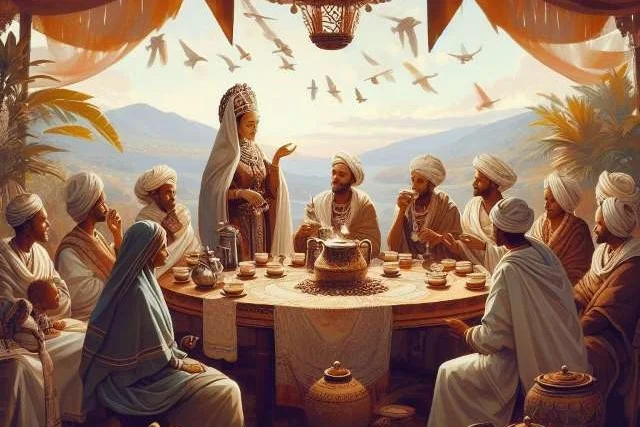Unveiling the Ethiopian Coffee Ceremony: A Journey into Cultural Tradition
The Ethiopian coffee ceremony is a time-honored ritual celebrating hospitality, community and cultural heritage. For centuries, it has connected Ethiopians across generations through its intricate preparation and rich meaning.
Key Takeaways of the Ethiopian Coffee Ceremony
- Ethiopian Coffee Ceremony’s Cultural Significance: The Ethiopian coffee ceremony celebrates hospitality, community, and heritage, fostering traditions.
- Ethiopia’s Role as the Birthplace of Coffee: Ethiopia, the birthplace of coffee, boasts a rich cultural history with significant coffee production.
- Meticulous Coffee Preparation: The Ethiopian coffee ceremony involves precise preparation for a delightful sensory experience.
- Symbolism in the Serving Ritual: The serving ritual symbolizes hospitality, respect, and community through three rounds of coffee pouring.
The Essence of Ethiopian Hospitality

The coffee ceremony embodies the warmth of Ethiopian hospitality and social connection. This beloved tradition plays a vital role in everyday life and special events, fostering a sense of community. At its core, it is about bringing people together and upholding cultural traditions.
A Historical Glimpse: Coffee’s Roots in Ethiopia

Ethiopia is the birthplace of coffee, with a legacy spanning back centuries. As legend goes, coffee was discovered by a goat herder named Kaldi in ancient Ethiopia. He noticed his goats became energetic after eating the red berries of the coffee shrub. From these mythic beginnings, coffee farming and drinking spread across the country.
Coffee remains integral to Ethiopian culture today. Key facts:
- Ethiopia is the 6th largest global coffee producer
- Coffee accounts for over 60% of Ethiopian exports
- Around 15 million Ethiopians work in the coffee industry
The enduring Ethiopian coffee ceremony tradition celebrates this rich history.
The Ethiopian Coffee Ceremony Preparation: A Symphony of Sensory Delights
The ceremony involves meticulous preparation to engage the senses and create a welcoming environment. The host takes great pride in sourcing ingredients and arranging the setting.
She selects a well-ventilated area and lays out seats, beds or stools. Soothing frankincense is lit to perfume the air. The host dons a traditional white cotton dress and readies freshly roasted beans, jebena pots, and tiny handleless cups.
These thoughtful touches help set the stage for a delightful sensory experience.
Roasting and Grinding: Unveiling the Essence of Coffee
Roasting the Beans: A Vital Step
Proper roasting is vital to prepare the beans, transforming them into aromatic, flavorful form. The host roasts them in a long-handled pan over hot charcoal, 10-15 minutes. She constantly stirs and shakes the beans so they roast evenly. The beans double in size, crackling as oils emerge. When ready, they release a sweet, nutty fragrance.
| Roasting Process |
| Heated in pan over charcoal |
| Constant stirring and shaking |
| Takes 10-15 minutes |
| Beans crackle and pop |
| Sweet, nutty aroma when ready |
Grinding with Mortar and Pestle
The roasted beans are ground into a fine powder using mortar and pestle. This traditional grinding maximizes flavor extraction during brewing.
The host rhythmically pounds each handful of beans, clockwise and anticlockwise in the mortar. Grinding takes about 30 minutes of hard work. Finally grinding unleashes the coffee’s enticing aromas.
Brewing: The Art of Patience and Precision

The finely ground coffee is carefully measured into the jebena, a traditional clay pot designed for brewing. The jebena brews slowly atop hot charcoal to extract optimal flavor.
As it simmers, a rich crema forms on the surface. The host meticulously monitors time and temperature to achieve ideal balance. Too much heat burns the coffee, while too little lacks depth.
Proper technique requires 5-10 minutes to maximize taste and aroma. The coffee’s scent fills the air when nearly ready, signalling the next stage.
| Keys to Proper Brewing | Purpose |
| Precise charcoal heat | Extracts oils and full flavor |
| Gentle shaking/rotating | Distributes grounds evenly |
| 5-10 minutes brew time | Allows complexity to emerge |
| Rich surface crema | Indicates coffee is ready |
The Serving Ritual: A Symbol of Hospitality and Respect
The serving ritual symbolizes hospitality and respect through its precise traditions. The host gracefully pours coffee from the jebena into tiny handleless cups. She pours three rounds, each with unique significance:
- Abol – The strong, first pour for honored elders
- Tona – The mild, second pour for everyone
- Baraka – The subtle, closing pour considered most blessed
The host ensures each cup receives an equal pour. Frankincense scents the air between rounds, as quiet conversation flows.
The First Round: Abol – A Taste of Tradition
Abol is reserved solely for honored elders and the most esteemed guests as a sign of utmost respect. The host personally serves Abol to each elder, bowing slightly in deference as they accept the cup with both hands. Elders are expected to slowly sip and savor the rich, intense flavors of Abol before the next round is served.
This potent initial pour marks the ceremonial beginning, both literally as the first coffee and symbolically as the start of the social and spiritual journey. Abol’s bold taste awakens the palate, while its cultural significance opens the mind and spirit to the ritual’s meaning.
- Abol represents the first steps in the coffee ceremony, setting the tone through its strong stimulation and taste profile. Just as it energizes the drinker, Abol sets the stage for meaningful conversation and connection.
The Second Round: Tona – A Balancing Act
After Abol is complete, the mellower pour of Tona begins for the remaining guests. Tona strikes a delicate balance with milder yet more complex flavors than Abol. Its moderate profile encourages relaxed sipping and appreciation of the tastes.
While Abol honors elders, Tona fosters a communal spirit by including all guests to enjoy together. Conversation flows freely and connections deepen during Tona, representing the heart of the ceremony.
- Tona signifies the communal journey itself – the interactions between guests are central to the ritual’s purpose. If Abol marked the start, Tona represents the meaningful bonds brewed over coffee.
The Third Round: Baraka – A Blessing of Prosperity
Baraka is the final coffee served, often paired with a snack to conclude the ceremony. As the lightest pour, Baraka uplifts the spirit with its delicate profile. It represents closure, leaving guests feeling replenished.
Baraka marks the end of the ceremonial journey. It renews the soul, conferring a symbolic spiritual blessing. Guests linger to soak in Baraka’s grace and sense of community.
- Baraka translates to ‘blessing’ in a literal and figurative sense. It provides blessed closure to the ceremony, uplifting and inspiring guests as they depart.
Other Notable Coffee Traditions and Cultures
While Ethiopia originated coffee, various cultures have developed distinct coffee cultures, such as:
- Italian Coffee Culture: Espresso methods created strong, concentrated coffee as a base for drinks like cappuccinos. The espresso bar is integral to Italian lifestyle.
- Scandinavian Coffee Culture: Scandinavians have the highest per capita coffee consumption. Their style emphasizes light roasts and homemade black coffee.
- Turkey: Turkish coffee culture revolves around finely powdered coffee boiled in a cezve with sugar. It is served strong and black.
- Japan: Intricate Japanese coffee rituals value presentation, such as Hanami drip coffee blooming into floral shapes.
Ethiopia’s ceremony remains unique, while its coffee seeds diverse global traditions.
Rounding it All Up: A Cultural Tapestry Woven with the Ethiopian Coffee Ceremony
The Ethiopian coffee ceremony binds generations through its rich heritage. In today’s fast-paced world, this ritual reminds us to slow down, connect, and savor meaningful experiences. The ceremony’s intricate preparations transform coffee drinking into a transcendent cultural tradition.
Ethiopian Coffee Ceremony FAQs
The Ethiopian coffee ceremony is a time-honored tradition celebrating hospitality, community, and cultural heritage. For centuries, its intricate preparation and rich meaning have connected Ethiopians across generations.
Coffee originated in Ethiopia and remains integral to its culture today. Ethiopia is the 5th largest global producer, with coffee accounting for over 60% of exports and employing around 15 million Ethiopians. The ceremony celebrates this rich coffee history.
The care, precision, and meaning behind each step embody the warmth of Ethiopian hospitality. The host takes great pride in preparing the space, ingredients, and coffee. Serving coffee shows respect and gratitude to guests.
Each round carries a unique meaning. Abol shows respect for elders, Tona builds community, and Baraka confers a spiritual blessing. The rounds represent beginning the journey, the journey itself, and the blessed end.
The leisurely pace fosters conversation and connection. Tona represents the communal bonds brewed over coffee. Guests linger after Baraka, soaking in the sense of community. The ceremony bridges generations through this shared experience.








